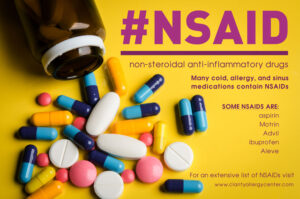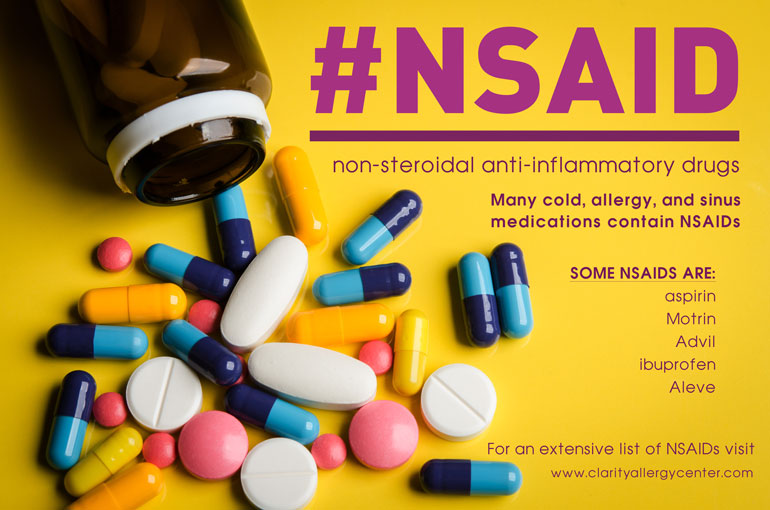Can NSAIDs contribute to heart attacks? Given that in some populations like the elderly as many as 95% of people take NSAIDs safety is important to consider.
And in all honesty, as my Ironman training is increasing and so is my age, I’ve been having some aches and pains myself that I would like a quick, simple, cheap solution to!
Let’s explore NSAIDs together, shall we?

NSAID types
First, what ARE NSAIDs?
Non-steroidal Anti-Inflammatories, or NSAIDs, are painkillers that aren’t steroids. You know them as: Advil & Motrin (ibuprofen), Aleve, and Aspirin. Tylenol (acetaminophen) is a fever reducer and pain reliever, but because it doesn’t have the anti-inflmmatory effects of NSAIDs so it’s not considered one.
They are prescribed for everything from headaches to menstrual cramps to both osteo and rheumatoid arthritis, gout, dental pain – just about anything that’s got pain associated with it.
Here are the names of the prescription NSAIDs.
Generic names/common brand names
- Celecoxib (Celebrex®).
- Diclofenac (Voltaren® [available by brand name in topical form]).
- Fenoprofen (Nalfon®).
- Indomethacin (Indocin® [available by brand name in liquid form]).
- Ketorolac tromethamine (Toradol®).
Generic names (no brands)
- Meclofenamate sodium.
- Diflunisal.
- Tolmetin.
- Ketoprofen.
- Flurbiprofen.
How do NSAIDs work?
NSAIDs (nonsteroidal anti-inflammatory drugs) work by blocking the production of certain chemicals in the body called prostaglandins. Prostaglandins are produced by cells in response to injury or inflammation and are responsible for causing pain, swelling, and fever. By inhibiting the production of prostaglandins, NSAIDs help to reduce pain, inflammation, and fever.
Ok, but really what are prostaglandins? The OW neurochemical!
Years ago I read a cool book called Pain Free! that prompted a food-exploration of production of pain in my body. I was having really bad menstrual cramps – like puking in public and you just can’t hide it kind of pain. When I read this book I found out that I was feeding my pain neurochemicals and making it easy for my body to feel pain. As I was a new martial artist at the time, trying to keep up with the cool kids in class, I was particularly interested in not looking like a pansy. I can’t say I succeeded, but I learned how to be a tiny bit less of a pansy. So, what are these mysterious pain chemicals?
Prostaglandins are hormone-like substances that are produced by cells throughout the body in response to various stimuli such as injury, infection, inflammation, and stress. They are involved in many physiological processes, including:
- Inflammation: Prostaglandins are involved in the inflammatory response, which is a complex process that helps the body fight infection and heal injuries. They cause blood vessels to dilate, making them more permeable, which allows white blood cells and other immune cells to enter the affected tissue and fight infection.
- Pain: Prostaglandins are involved in the perception of pain. They can sensitize nerve endings, making them more sensitive to pain signals.
- Blood clotting: Prostaglandins are involved in the formation of blood clots. They can cause platelets to aggregate, which is an important step in the blood clotting process.
- Reproductive system: Prostaglandins play a role in the female reproductive system, where they are involved in the regulation of ovulation, menstruation, and labor. (Ding ding ding!!!!! That’s where mine came from!)
NSAIDs (nonsteroidal anti-inflammatory drugs) work by inhibiting the production of prostaglandins. By blocking the production of prostaglandins, NSAIDs can reduce inflammation, pain, and fever. However, as will be discussed in other sections, this mechanism can also cause side effects such as kidney damage, gastrointestinal ulcers, and increased risk of asthma.
What are side effects?
Maybe you’re a person that thinks: “Oh, I’m lucky, I don’t have that side effect.” Or, “Oh, I’m unlucky, I tend to get all the side effects.” What if, taken long enough, EVERYONE would tend to get side effects from a drug, because it wears down the body over time? The liver and kidneys metabolize pharmaceuticals, so those organs are going to show that wear over time.
SIX most common side effects with NSAIDs
NSAIDs inhibit both COX-1 and COX-2 enzymes, which can cause side effects such as stomach ulcers, bleeding, and kidney damage. More selective NSAIDs, such as celecoxib, target only the COX-2 enzyme, which can reduce the risk of these side effects.
1. NSAIDs and Heart Attacks – and stroke and blood clots – increases risk by 20-50%
NSAIDs can interfere with the normal function of platelets, which are blood cells that play a crucial role in clotting. When platelets clump together and form a clot, it can block blood flow to the heart and cause a heart attack. So one way NSAIDs can cause heart attacks is by making platelets more likely to clump together and form a clot.
Another way NSAIDs can cause a heart attack is by increasing in blood pressure, which can put additional strain on the heart and increase the risk of a heart attack. Pain by itself is known to increase blood pressure, too. Some studies have suggested that certain NSAIDs, such as diclofenac, may be more likely to raise blood pressure than others.
A final way some NSAIDs can cause heart attack is that certain NSAIDs such as rofecoxib (Vioxx), have been found to directly damage the lining of blood vessels and promote the formation of blood clots.
2. GI Issues – increases risk by 100-200%
Years ago I was lucky enough to be in the room during this training, when the instructor shared that NSAIDs are shown to cause ulcers in the small intestine in 100% – yes, that’s one hundred percent! – of HEALTHY PEOPLE with no known health issues within SEVEN DAYS of taking them. I was so astonished I was kind of ticked off, and I thought there must be a biased study. I actually went on the attack against my own industry to a split second. I’m embarassed to say this now, but I demanded to know who conducted this study. I was humbled when the answer was, “The Mayo Clinic.” I couldn’t help but wonder why that wasn’t listed on the tag at the drugstore. “Advil, $10.97 and one or more peptic ulcer within 7 days.” I’d like to know what I’m actually buying!
When NSAIDs are taken, they reduce the production of prostaglandins, which can lead to a decrease in the protective mucus and bicarbonate production. As a result, the stomach and intestinal lining can become more susceptible to damage from stomach acid and digestive enzymes, leading to the formation of ulcers.
Additionally, NSAIDs can cause direct damage to the lining of the stomach and intestines by inhibiting the production of certain enzymes that are important for the repair and maintenance of the lining.
The risk of developing ulcers is higher in people who take high doses of NSAIDs or who take them for long periods of time. If you do take an NSAID, take it with foods to help to reduce the risk of developing ulcers. Or if you already take a PPI, you can take it with that, but proton pump inhibitors carry their own increased risk of cardiac events.
Heal digestive issues naturally with Longevity Wellness!
3. Thyroid Dysfunction – increase risk by up to 50%
This is a relationship I researched because I observed a correlation between NSAIDs and thyroid function on a client through muscle testing, and I went digging. I had never heard of this connection, and I figured you probably hadn’t either.
Thyroid function is regulated by the thyroid gland, which produces hormones that control many of the body’s processes, including metabolism. The thyroid gland is also regulated by the hypothalamus and pituitary gland in the brain.
Some studies suggest that NSAIDs may affect the production of thyroid hormones by interfering with the conversion of the inactive form of thyroid hormone (T4) to the active form (T3) in the liver and other tissues. This could lead to hypothyroidism (an underactive thyroid gland) in some people who take NSAIDs for long periods of time.
Other studies have suggested that NSAIDs may affect the hypothalamus and pituitary gland, which could in turn affect thyroid function.
Heal thyroid issues naturally with Longevity Wellness!
4. Increased risk of asthma – increase risk by 100-200%
Here are a few possible ways that NSAIDs may increase the risk of asthma:
- Inhibition of cyclooxygenase (COX) enzymes: NSAIDs work by inhibiting the COX enzymes, which play a role in the production of prostaglandins. Prostaglandins are substances that are involved in inflammation and the body’s immune response. When NSAIDs inhibit COX enzymes, it can lead to a reduction in the production of prostaglandins, which can alter the balance of inflammation and immune response in the body. In some people, this altered balance may increase the risk of asthma.
- Activation of leukotrienes: Some studies have suggested that NSAIDs may activate leukotrienes, which are substances that play a role in inflammation and asthma. This activation may lead to an increase in asthma symptoms in some people.
- Aspirin-exacerbated respiratory disease (AERD): AERD is a condition in which asthma symptoms are worsened by the use of aspirin and other NSAIDs. In people with AERD, the use of NSAIDs can trigger a severe asthma attack or other respiratory symptoms. The mechanism behind AERD is not completely understood, but it is thought to involve a hypersensitivity reaction to aspirin and other NSAIDs.
5. Kidney damage – increase risk by 100-500%
NSAIDs (nonsteroidal anti-inflammatory drugs) can cause kidney damage by affecting the blood flow to the kidneys, decreasing the production of a substance called prostaglandins, and directly damaging the kidney tissue.
- Blood flow to the kidneys: NSAIDs can reduce blood flow to the kidneys by constricting the blood vessels that supply the kidneys. This can reduce the amount of oxygen and nutrients that reach the kidneys, which can damage the kidney tissue.
- Prostaglandin production: Prostaglandins are substances that help regulate blood flow to the kidneys and protect the kidneys from damage. NSAIDs work by inhibiting the production of prostaglandins, which can reduce the kidney’s ability to protect itself.
- Direct damage to kidney tissue: Some studies suggest that NSAIDs can cause direct damage to the kidney tissue, leading to inflammation and injury. This damage may be more common in people who have preexisting kidney problems or who take high doses of NSAIDs for long periods of time.
The risk of kidney damage from NSAIDs is higher in people who have preexisting kidney disease, dehydration, heart failure, or liver disease. People who take high doses of NSAIDs for long periods of time or who take multiple NSAIDs at the same time are also at higher risk.
As you can see, NSAIDs significantly increase the risk of heart attacks and a number of other diseases.
NEXT EMAIL:
WHAT TO DO INSTEAD!
In the meantime, if you’re struggling with pain or inflammation, WE CAN HELP! Call or email today to book a consult with Dr. Cynthia. (941) 923-9355 or office@longevitywc.com. And if you know someone who takes NSAIDs like candy, please share this with them! We don’t know what we don’t know – and now YOU know!
References:
https://my.clevelandclinic.org/health/drugs/11086-non-steroidal-anti-inflammatory-medicines-nsaids
https://www.verywellhealth.com/nsaids-for-chronic-pain-2564481
https://pubmed.ncbi.nlm.nih.gov/14671157/ – Thyroid and NSAIDs
https://www.mayoclinic.org/drugs-supplements/naproxen-oral-route/side-effects/drg-20069820



